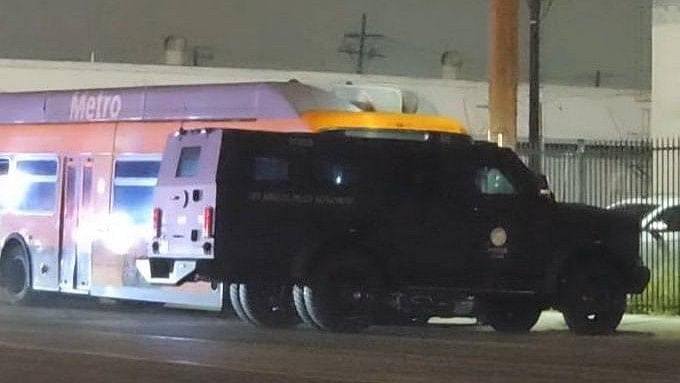
Purported visuals showing a SWAT team van being parked in front of the hijacked bus, as shared on social media.
Credit: X/@_PalestineFree
Los Angeles: A gunman hijacked a bus in South Los Angeles early Wednesday and led police on a low-speed chase that ended an hour later in the city's downtown, with one passenger killed, a suspect in custody and the bus driver being lauded as a hero.
Officers were initially called to an intersection in South Los Angeles about 12:45 am, after the driver of the Los Angeles Metro bus pushed a button that alerted emergency dispatchers to an incident and that prompted the bus to flash a sign reading, "911 call police."
Police officers arrived and tried to talk to the passengers on board, Blake Chow, an assistant chief with the Los Angeles Police Department, said at a news conference Wednesday afternoon. But the bus "ended up rolling away," leading to a slow police chase through the city because officers believed that a person on board was armed, Chow said.
About an hour later, officers used spike strips to stop the bus, and a SWAT team used flash-bang devices and then boarded the vehicle. Footage from the scene appeared to show the bus driver being pulled out through a side window.
One of the passengers, whom authorities have not yet identified, was taken to a hospital where he died of gunshot wounds. Another passenger was injured, though officials said they did not know the extent of the injuries.
The accused gunman, identified as Lamont Campbell, 51, was booked into Los Angeles County Jail on suspicion of murder, Chow said. Officials did not identify a possible motive for the hijacking.
Officials applauded the bus driver's actions, noting that he had worked for the transit agency for more than a decade.
"With a gunman on board and his life on the line, he had the composure and the wherewithal to push the silent alarm," said Janice Hahn, a member of the Los Angeles County Board of Supervisors and chair of the board that governs the Los Angeles Metro system. "I know all of us are grateful for his courage and quick thinking in the middle of the night."
The episode exacerbated long-standing concerns about the safety on the Metro system, which includes 109 miles of rail lines and more than 13,000 bus stops spanning a metropolis over 4,000 square miles.
Officials emphasized that the transit agency was working to increase the number of police officers throughout the system. They said they had started pilot programs aimed at detecting passengers carrying weapons on trains or buses and had begun installing safety barriers around bus drivers' seats. Such a barrier was on the bus that was hijacked Wednesday, which Hahn said had very likely helped protect the driver.
The chilling ordeal came a month after organizers with the Paris Olympics passed the torch to Los Angeles, where leaders have vowed to host a "car-free" Games in 2028 by relying on trains and buses.
Officials have said that the stakes are high for the Olympics but that ultimately, improvements for the Games should serve Angelenos.
"What I think about every day is those riders in Los Angeles who have to take our system," Hahn said.
Stephanie Wiggins, the CEO of Los Angeles Metro, emphasized Wednesday that because of the system's enormous footprint, whatever was happening more broadly in the region would bleed into transit.
"The fact is that Metro is part of our community," she said. "It's an essential part of the daily lives of millions of Angelenos, and it's also a reflection of the community, and that includes the criminal activity and the weapons that flow onto our buses from our community streets."
She added that the agency was also contending with homelessness, because transit vehicles and structures become de facto shelters, as well as untreated mental illness and other social issues.
"We need a whole of government approach," Wiggins said.
Still, a string of high-profile violent occurrences in the transit system in recent months has rattled commuters.
In March, a man was arrested in Los Angeles on suspicion of kidnapping after police said he had hijacked a bus. The bus crashed into several vehicles and a hotel, injuring one person. In April, a woman was stabbed to death at a Metro station in an apparently unprovoked attack as she was heading home from an overnight shift at a burger spot.
Mayor Karen Bass ordered a "surge" in law enforcement presence in the transit system in May.
On Wednesday, Los Angeles Metro officials said that the surge appeared to have contributed to a decrease in crimes against people and property in the system.